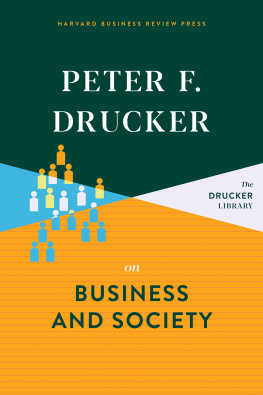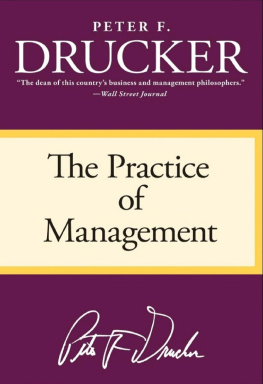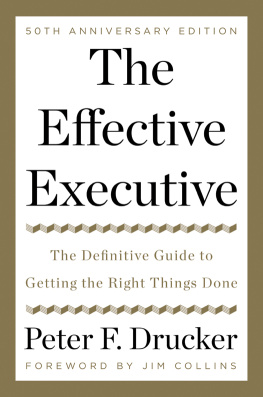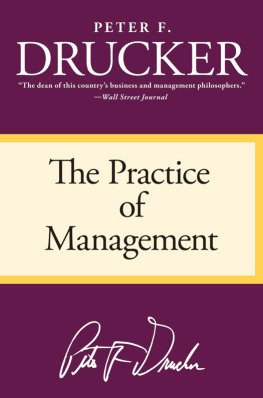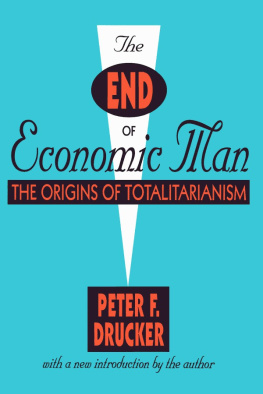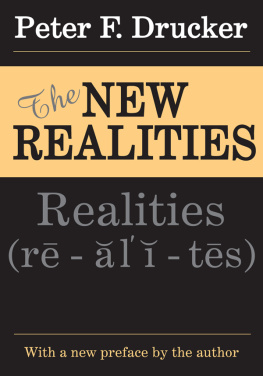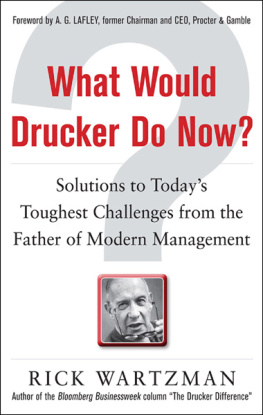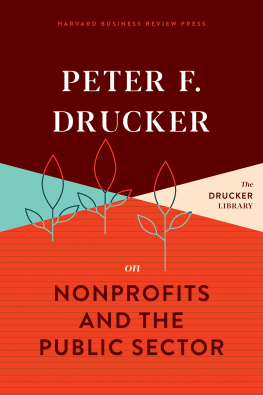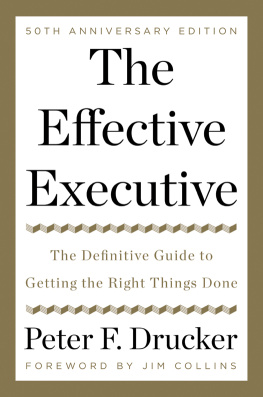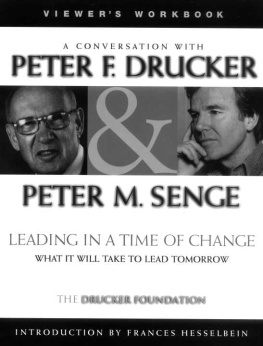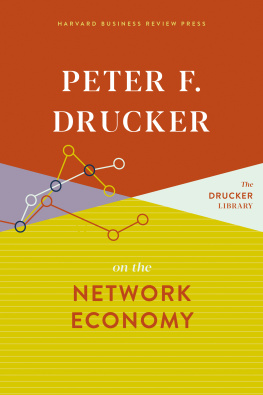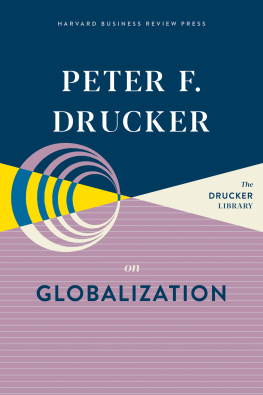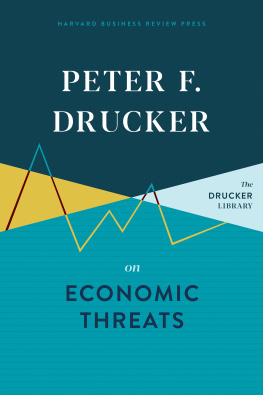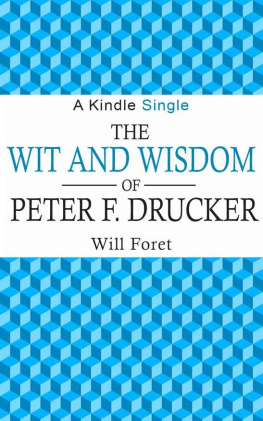Peter F. Drucker - Peter F. Drucker on Business and Society
Here you can read online Peter F. Drucker - Peter F. Drucker on Business and Society full text of the book (entire story) in english for free. Download pdf and epub, get meaning, cover and reviews about this ebook. year: 2020, publisher: Harvard Business Review Press, genre: Business. Description of the work, (preface) as well as reviews are available. Best literature library LitArk.com created for fans of good reading and offers a wide selection of genres:
Romance novel
Science fiction
Adventure
Detective
Science
History
Home and family
Prose
Art
Politics
Computer
Non-fiction
Religion
Business
Children
Humor
Choose a favorite category and find really read worthwhile books. Enjoy immersion in the world of imagination, feel the emotions of the characters or learn something new for yourself, make an fascinating discovery.
- Book:Peter F. Drucker on Business and Society
- Author:
- Publisher:Harvard Business Review Press
- Genre:
- Year:2020
- Rating:5 / 5
- Favourites:Add to favourites
- Your mark:
- 100
- 1
- 2
- 3
- 4
- 5
Peter F. Drucker on Business and Society: summary, description and annotation
We offer to read an annotation, description, summary or preface (depends on what the author of the book "Peter F. Drucker on Business and Society" wrote himself). If you haven't found the necessary information about the book — write in the comments, we will try to find it.
Peter F. Drucker on Business and Society — read online for free the complete book (whole text) full work
Below is the text of the book, divided by pages. System saving the place of the last page read, allows you to conveniently read the book "Peter F. Drucker on Business and Society" online for free, without having to search again every time where you left off. Put a bookmark, and you can go to the page where you finished reading at any time.
Font size:
Interval:
Bookmark:

The Drucker Library
Peter F. Drucker on Technology
Peter F. Drucker on Business and Society
Peter F. Drucker on Management Essentials
Peter F. Drucker on Nonprofits and the Public Sector
Peter F. Drucker on Economic Threats
Peter F. Drucker on Globalization
Peter F. Drucker on Practical Leadership
Peter F. Drucker on the Network Economy

HBR Press Quantity Sales Discounts
Harvard Business Review Press titles are available at significant quantity discounts when purchased in bulk for client gifts, sales promotions, and premiums. Special editions, including books with corporate logos, customized covers, and letters from the company or CEO printed in the front matter, as well as excerpts of existing books, can also be created in large quantities for special needs.
For details and discount information for both print and ebook formats, contact .
Copyright 2020 Harvard Business School Publishing Corporation
All rights reserved
No part of this publication may be reproduced, stored in or introduced into a retrieval system, or transmitted, in any form, or by any means (electronic, mechanical, photocopying, recording, or otherwise), without the prior permission of the publisher. Requests for permission should be directed to , or mailed to Permissions, Harvard Business School Publishing, 60 Harvard Way, Boston, Massachusetts 02163.
First eBook Edition: Aug 2020
ISBN: 978-1-63369-963-2
eISBN: 978-1-63369-964-9
This book is one of several volumes in the Drucker Library published by Harvard Business Review Press.
The essays in this volume were written between 1946 and 1969. When Peter Drucker collected them for this volume in 1971, he resisted, as he explained in a subsequent volume of essays, the temptation to rewrite, contending that it was only fair to let the reader decide how well the authors opinions, prejudices, and predictions have stood the test of time.
Some fifty years later, readers may find Druckers language at times dated or inappropriate and some of his arguments controversial or utterly wrongheaded. But as editors, we too have chosen to resist the urge to tamper with the original texts, for we did not feel confident that we could always tell the difference between updating and censorship. Further, we believe that one of the many delights of these essays for current readers, who enjoy the advantage of complete hindsight extending over the entire period in which Drucker made predictions, is in judging how remarkably prescient and applicable so much of his thinking remains today.
Do the essays in this volume have anything in common except the author? At first sight they may look like random scatter without underlying theme or unifying thesis. An essay on The New Markets, which treats the financial fads and follies of the 1960s as symptoms of structural change in economy and society, may seem a strange bedfellow for an essay on Kierkegaard, surely the least market-oriented thinker of the modern West. An evocation of Henry Ford as the Last Populist, and simultaneously the fulfillment and the denial of the nineteenth centurys agrarian and Jeffersonian dreams, might seem very far away from the internal stresses of the Japanese economic miracle or the pathos and bathos of This Romantic Generation, todays educated young people.
Yet all these pieces, despite the diversity of their topics, have a common subject matter and a common theme. They are all essays in what I would call political (or social) ecology.
This term is not to be found in any university catalogue. But the only thing that is new about political ecology is the name. As a subject matter and human concern, it can boast ancient lineage, going back all the way to Herodotus and Thucydides. It counts among its practitioners such eminent names as de Tocqueville and Walter Bagehot. Its charter is Aristotles famous definition of man as zoon politikon, that is, social and political animal. As Aristotle knew (though many who quote him do not), this implies that society, polity, and economy, though mans creations, are nature to man, who cannot be understood apart from and outside of them. It also implies that society, polity, and economy are a genuine environment, a genuine whole, a true system, to use the fashionable term, in which everything relates to everything else and in which men, ideas, institutions, and actions must always be seen together in order to be seen at all, let alone to be understood.
Political ecologists are uncomfortable people to have around. Their very trade makes them defy conventional classifications, whether of politics, of the market place, or of academia. Was de Tocqueville, for instance, a liberal or a conservative? What about Bagehot? Political ecologists emphasize that every achievement exacts a price and, to the scandal of good liberals, talk of risks or trade-offs, rather than of progress. But they also know that the man-made environment of society, polity, and economics, like the environment of nature itself, knows no balance except dynamic disequilibrium. Political ecologists therefore emphasize that the way to conserve is purposeful innovationand that hardly appeals to the conservative.
Political ecologists believe that the traditional disciplines define fairly narrow and limited tools rather than meaningful and self-contained areas of knowledge, action, and eventsin the same way in which the ecologists of the natural environment know that the swamp or the desert is the reality and ornithology, botany, and geology only special-purpose tools. Political ecologists therefore rarely stay put. It would be difficult to say, I submit, which of the chapters in this volume are management, which government or political theory, which history or economics. The task determines the tools to be used: but this has never been the approach of academia.
Students of mans various social dimensionsgovernment, society, economy, institutionstraditionally assume their subject matter to be accessible to full rational understanding. Indeed, they aim at finding laws capable of scientific proof. Human action, however, they tend to treat as nonrational, that is, as determined by outside forces, such as their laws. The political ecologist, by contrast, assumes that his subject matter is far too complex ever to be fully understoodjust as his counterpart, the natural ecologist, assumes this in respect to the natural environment. But precisely for this reason the political ecologist will demandlike his counterpart in the natural sciencesresponsible actions from man and accountability of the individual for the consequences, intended or otherwise, of his actions.
An earlier volume of essays of mine, Technology (published in 1970), centered on what used to be called the material civilization: business enterprise, its structure, its management, and its tools; technology and its history, and so on. The present volume is more concerned with economic, political, and social processes: the early diagnosis of fundamental social and economic change; the relationship between thoughteconomic, political, or socialand actions; the things that work and dont work in certain traditions, whether those of America or those of Japan; or the conditions for effective leadership in the complex structures of industrial society and giant government. But in the last analysis, the present essays, and those in the earlier volume, have the same objective. They aim at an understanding of the specific natural environment of man, his political ecology, as a prerequisite to effective and responsible action, as an executive, as a policy-maker, as a teacher, and as a citizen.
Font size:
Interval:
Bookmark:
Similar books «Peter F. Drucker on Business and Society»
Look at similar books to Peter F. Drucker on Business and Society. We have selected literature similar in name and meaning in the hope of providing readers with more options to find new, interesting, not yet read works.
Discussion, reviews of the book Peter F. Drucker on Business and Society and just readers' own opinions. Leave your comments, write what you think about the work, its meaning or the main characters. Specify what exactly you liked and what you didn't like, and why you think so.

